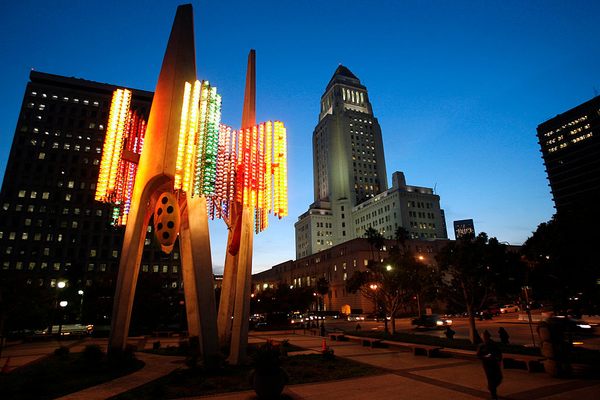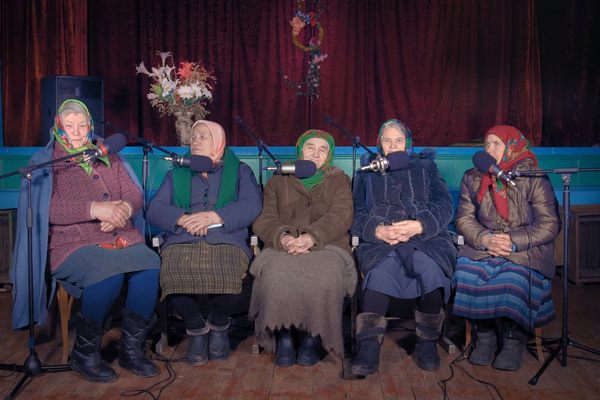The Hottest Music in China is About President Xi Jinping
Like “Hamilton” but…different.

Vice President Biden Raises a Toast in Honor of Chinese President Xi (left) at a State Luncheon at the State Department. (Photo: US Department of State/Public Domain)
This week, The Guardian’s Tom Phillips rounded up the latest contributions to a growing musical genre: songs about Chinese president Xi Jinping. The body of work includes rock songs, ballads, and pop tunes composed by average citizens. The growth in Xi-centric music is creating unease in some China observers, who note early signs of an emerging cult of personality around the president—something unseen in China since Mao Zedong.
This new generation of propagandistic storytelling, though, has something different than that of the previous generation. It has hip hop.
It started last October, when Beijing clued the English-speaking world into their latest Five Year Plan with a slickly produced English-language song and animated video featuring a David Bowie lookalike. According to Hong Kong’s South China Morning Post, the government chose to highlight the plan to an international audience as an indication of its growing global stature.
“If you want to know what China’s gonna do / Better pay attention to the Shi San Wu.” (Video: New China TV/Youtube)
But five year plans are just a standard feature of the centrally-planned economy, not a Xi Jinping innovation. In December, the CCP dropped “The Reform is Two Years Old”, a rap celebrating the achievements—remember, this is propaganda, not facts—of the Xi-led Central Leading Group for Comprehensively Deepening Reforms. The translated lyrics provided by the South China Morning Post include such contributions to the corpus of political rap as, “Rule the party strictly / Govern the country by law,” interspersed with sound bites from Xi’s speeches.
Beijing’s latest official music release is “Four Comprehensives”, a rap aimed at explaining Xi’s political theory, which South China Morning Post describes as “‘[C]omprehensively’ building a moderately prosperous society, deepening reform, governing the country according to the rule of law, and enforcing strict Communist Party discipline.”
The CCP’s official songs might have the slickest production values, but the songs written by unaffiliated Chinese musicians take the prize for being the most personally complimentary towards China’s leader. The bards of Xi refer to him as “Xi Dada,” which translates to “Uncle” or “Big Daddy” Xi. Phillips notes a number of Xi-centric hits in The Guardian: “‘Our Xi Dada’, ‘The Idol Xi Dada’, ‘If You Want to Marry, Marry Somebody Like Xi Dada’, ‘China has its Xi Dada’, ‘Be a Man Like Xi Dada’ and, best known of all, ‘Xi Dada Loves Peng Mama’ (a reference to China’s first lady, Peng Liyuan).” In addition, Reddit users have attempted to compile a list of songs about Xi, adding “President Xi Be By My Side”, “Xi Dada, Corruption Afraid”, and others to the list.
“If You Want to Marry, Marry Somebody Like Xi Dada” (Video: Laosan Hu/Youtube)
“If You Want to Marry, Marry Somebody Like Xi Dada,” is one of the more popular songs, written by Tang Jiayun—who also wrote “Be a Man Like Xi Dada”—and sung by the relatively unknown Hu Xiaoming. Translated lyrics from the South China Morning Post provide an idea of the musicians’ high esteem for President Xi:
“If you want to marry, marry someone like Xi Dada, a man full of heroism with an unyielding sprit [sic]; no matter how the world changes and how many difficulties lie ahead, he will insist and keep moving forward.”
The similarly popular “Xi Dada Loves Peng Mama,” written by Song Zhigang, is similarly exalting; according to the New York Times, the song’s lyrics state, “Men should study Xi Dada / Women should study Peng Mama.” The Times relates quotes from an interview Song gave with a local Chinese newspaper, explaining that he was inspired by depictions of Xi and his wife in the media, alluding to Xi’s campaign against corruption and Peng’s career as a singer and People’s Liberation Army officer.
“Xi Dada Loves Peng Mama” (Video: 顾太师/Youtube)
As the Times notes, odes to Xi like those written by Song and Tang complement the party’s efforts towards crafting a positive image for Xi; for some observers, this signals a worrying move towards establishing a cult of personality around the president. In the Guardian article, Carl Minzer of Fordham University pointed out the “echoes that go back to the Maoist era.” Revolutionary songs such as “Sailing the Seas Depends on the Helmsman” and “Without the Communist Party, There Would Be No New China”, were a hallmark of Mao’s leadership, reaching their peak popularity during the Cultural Revolution when a number of revolutionary propaganda songs were combined into a full-fledged “song and dance epic,” The East is Red.
“The East is Red” as performed in the film The East is Red (Video: JJHopsterful/Youtube)
Of course, Mao’s leadership of China was not just about making Communist musicals, and the many tragedies of the Cultural Revolution and Great Leap Forward were justified or downplayed through Mao’s sycophants. A recent article in The Economist points out other resurgent trends—for example, badges with Xi’s picture on them—that recall Mao’s cult of personality, and point out a “a growing politicization of the arts and media.”
If the CCP truly aims to establish a cult of personality around Xi Jinping, they may have competition—from the Great Leader himself. While Beijing began backing away from some aspects of Maoism immediately following the leader’s death, his personality cult has lingered on. In 1992, the China Record Company released The Red Sun: Odes to Mao Zedong Sung to a New Beat, a cassette of Cultural Revolution-era songs re-arranged to a disco beat. According to the book Shades of Mao: The Posthumous Cult of the Great Leader, the company did not expect the recording to be particularly popular, planning to sell 70 to 80 thousand copies—by 1993, over 14 million cassettes had been sold. Similarly, playwright Zhang Guangtian, formerly a pro-Democracy protester, wrote a 2001 play calling for a resurgence in Maoist ideology. Most recently, a 2009 government-run poll to find China’s favorite patriotic song saw generations born after the Cultural Revolution voting for “The East is Red,” which glorifies Mao as “the people’s savior.” An article in The Telegraph notes that the revival in Mao’s popularity may be partially due to frustrations with current economic challenges, such as Beijing’s increasing housing costs, combined with the still-enforced ban on negative depictions of the former leader.
Of course, all that depends on the party’s propaganda actually working. Reaction to the official CCP songs has been less than enthusiastic, according to The Guardian’s coverage of the release of “The Reform is Two Years Old,” with one Sina Weibo commenter writing, “All you can do is shout slogans, like a religious cult.” Considering, for example, that Beijing’s pollution regularly makes international headlines, despite “The Reform is Two Years Old” celebrating the government’s successful efforts towards improving the environment, the state propaganda machine seems to have a difficult road ahead. Perhaps the party can portray Xi “dropping the beat” on corruption in a dubstep song next.










Follow us on Twitter to get the latest on the world's hidden wonders.
Like us on Facebook to get the latest on the world's hidden wonders.
Follow us on Twitter Like us on Facebook